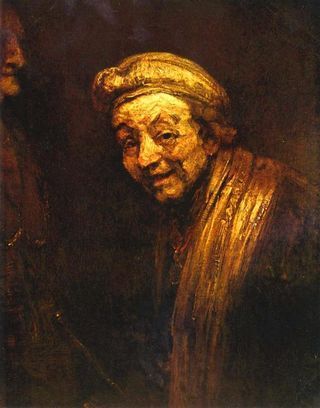Time wins the race (and dying of laughter)
I have been having a little race against time this week. That is to say the idea was that by Christmas day I would have finished the penultimate chapter of my laughter book -- which would leave one chapter to be written by 12th Night (the final target, and not so unrealistic as it might seem, as I have quite a polished lecture-version of what I want to say).
So every day I have been lighting the fire in the sitting room and sitting in a big armchair wired up to my laptop, books around my feet, typing away (something you couldnt have done before the age of JSTOR, I reflect -- almost every journal article I want, I can just call up onto my screen). It has been quite fun actually, but the fact is that I'm not going to make it by Christmas Day. Time is going to win by about 1000 words. (OK I could just keep slogging at it right up to midnight on Xmas morning, but there the presents to wrap and the cake to ice and the bird to stuff....)
The problem has been not a "block". In fact, I've been getting down well over 1000 words a day, and words that I'm fairly happy with. It's rather that I've found I had more to say than I thought (what I thought I could skip over in a brisk 750 words turned into a chunky 2500 word section). In particular over the last few days, I've been getting stuck into the ancient and modern trope of people who died laughing (you find it all over Western history, I'm not so sure about non-Western to be honest).
There are all kinds of examples...like Anthony Trollope who was supposed to have corpsed in the middle of a family reading of F. A. Anstey's comic novel Vice Versa (though it's a bit hard now to see what was quite so funny in it), or the unfortunate Mrs Fitzherbert who in 1782 collapsed in hysterics at a performance of the Beggars Opera and died a couple of day later, or more recently in 1975 the guy from Kings Lynn who died of laughter in the middle of an episode of the TV comedy, The Goodies.
In the ancient world there are similar stories, often told by Roman writers of earlier Greek celebrites. Festus tells, for example, of the death by laughter of the painter Zeuxis. And much the same is said of the philosopher Chrysippus, and the comic poet Philemon.
There is an awful lot of stuff written about whether, or in what sense, any of these deaths could possibly be true. Did the laughter trigger a heart attack? Or was the laughter itself the side effect of some underlying neurological condition/tumour? But that's not what I'm on about in my chapter.
I'm interested in what the ancient prompts were to these fatal hysterics. What was so funny to cause this corpsing? And how would be understand that?
In the case of Zeuxis, it was said to be looking at painting he had done of an old woman (that is probably what Rembrandt is alluding to in the self-portrait at the top of this post, the figure of the old lady is on the left of the canvas)... a classic example of ancient misogyny? or, as I would want to argue, a hint at the close connection between ancient laughter and imitation/mimesis.
For Chrysippus and Philemon it was seeing a donkey who had drunk wine eating figs that were meant for their own supper. Why so funny? My argument here is that it is something to do with crossing species boundaries. The donkey is acting like a human being.... And you can guess where the chapter is going to end up (on December 28th): with a quick romp through the Golden Ass, the hilarities of Lucius' transformation into an animal, and the festival of the God Laughter that the novel puts centre stage.
Now off to light the fire and sit down and write.
Mary Beard's Blog
- Mary Beard's profile
- 4134 followers




